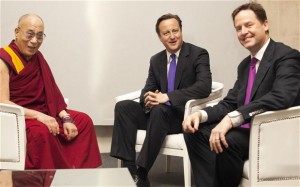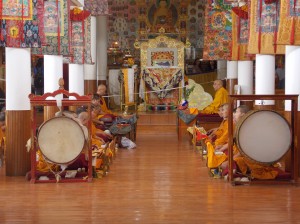
The Dalai Lama with British Prime Minister David Cameron and Deputy Prime Minister Nick Clegg
Photo: Clifford Shirley
Diplomatic fray over the temerity of western governments choosing to meet His Holiness the Dalai Lama without prior consent from Beijing has once again come to the fore– this time regarding the meeting last year between His Holiness, British Prime Minister David Cameron, and Deputy Prime Minister Nick Clegg. According to a Telegraph article earlier this month, China has demanded an apology from the UK government for meeting the Dalai Lama without first consulting Beijing, although sources for the UK government have stated that China was informed, and that the meeting was deliberately arranged to take place at St Paul’s Cathedral to emphasise the UK’s understanding of His Holiness as a religious, rather than political, leader.
China considers His Holiness as representing a subversive minority of Tibetans, and condemns his meeting foreign heads of state as ‘interference in internal affairs’. Britain has in the past spoken of its recognition of Tibet as a ‘part of China’, yet such assurances seem to do little to lessen Beijing’s ire any time an unsanctioned meeting takes place – the consequences usually involving reprimand and short shrift in diplomatic relations. The UK government has appeared to have further upset the apple cart on this occasion by rejecting calls for an apology, and emphasising the sovereign right of UK government officials to meet whomever they see fit: His Holiness, Downing Street has stated, is and always has been welcome in Britain.
As a consequence, something of a mini-ice age has developed in British-Chinese diplomatic relations. Cancelled visits by the premiers of both countries, and a reminder from China that Mr Cameron will not be welcome until an apology has been made, so far appear to mark the extent of the spat, but fears have been aired that Beijing’s warnings of ‘serious consequences’ might result in more tangible troubles for the UK.
Perhaps predictably, it is economics – the floundering European economy – that drives much of this fear. For the UK, The Telegraph notes that China’s investment totals some £8billion, and is crucial for a wave of significant infrastructural projects taking place in the country at present. For a number of commentators the veiled threats issued by Beijing to the UK government reflect Chinese awareness of the advantage they hold, and have raised concerns that Britain’s moral intransigence may jeopardise economic relations with the superpower.
Whilst in the past the growing political clout of China has caused governments sympathetic to the Dalai Lama and the Tibetan cause to remain cautious in their support, the global economic climate has meant that foreign governments depending on Chinese investment may simply not be able to afford upsetting her, and this may undermine their capacity to comment on human rights issues. China’s reminder to the UK that good political relations are necessary for continued investment suggests that anxieties may be well founded, and demonstrates the widespread impact the economic maelstrom has had for global, political and economic relations.
The interests of Tibet and Tibetans both at home and in exile may then be seen as yet another casualty of the vagaries of the international political economy. Beijing’s insistence on ‘vetting’ meetings between state heads and the Dalai Lama reflects awareness that China’s economic foothold in many democracies, alongside fear in the west of further collapse, can be used for effectively influencing the policy of foreign governments. And it seems to be working. As Edward Lucas, International Editor for the Economist has recently commented, Chinese ‘bullying’ has meant that it is growing increasingly difficult for Tibetan leaders to get meetings when they travel in Europe and the US.
Allowing economic self-interest to influence foreign policy, however much it is worth, sets a dangerous precedent. Of course many of these concerns may be overblown –both in terms of taking diplomatic bluster too seriously and through a certain tendency for media to demonise China and exaggerate her power. Despite the stand-off, it would appear that Chinese investments in Britain have not been affected, and it is worth bearing in mind that China’s growth also depends on strong relations with foreign partners. Giving in to China for fear of reprisals may be unnecessary, and demands of the type issued by Beijing may reflect more an opportunistic exploitation of western anxieties than prefiguring any form of real sanctions.
Either way, states should be cautious of the current trend in appeasing China. Edward Lucas, in his recent article The Tibetan Test, states that it is crucial now more than ever that countries stand up to such pressure and make it clear that they will openly and publicly meet figures such as the Dalai Lama if they so choose. Lucas argues that whilst China might be able to individually belittle states into concession, it will be very difficult to punish everyone if states collectively refuse to yield. Despite her growing power and influence in political, economic and cultural spheres, China also depends on productive and positive relations with the rest of the world.





 Print
Print Email
Email